- Home
- Stephen Hawking
George's Secret Key to the Universe
George's Secret Key to the Universe Read online
Find out about Stephen Hawking’s
books for adult readers at
www.hawking.org.uk.
To hear Lucy and Stephen Hawking talk about
George’s Secret Key to the Universe, visit
www.SecretKeyToTheUniverse.com.
For William and George, with love
Acknowledgments
I am so grateful to the many people who kindly gave their support to the “George” project. Tif Loehnis at Janklow and Nesbit has been wonderful throughout the whole process, as have all her staff at Janklow UK. Eric Simonoff at Janklow and Nesbit USA gave some truly stellar guidance. In Cambridge, Christophe Galfard made a huge contribution to the creative science story line, imagery, and detail. Judith Croasdell at DAMTP has been so patient, helpful, and kind in getting us organized and providing invaluable advice. Joan Godwin deserves very special thanks for her tireless and generous backup. Sam Blackburn for his technical support and work on the audio version. The amazing care team that surround my dad—for the dedication, affection, and good humor that they bring to their work.
At Random House, I’d like to thank Philippa Dickinson, Larry Finlay, and Annie Eaton for taking on the “George” books with such enthusiasm and verve. And Shannon Park and Sue Cook for being so brilliant to work with on the project. Garry Parsons’s charming illustrations have brought the story to life, and I am totally indebted to James Fraser for designing such an eye-catching and beautiful front cover. Sophie Nelson and Julia Bruce for the very thorough copyedit and proofread, Markus Poessel for his scientific fact-checking, Clare Hall-Craggs and Nina Douglas, Barry O’Donovan, Gavin Hilzbrich, Dan Edwards, Bronwen Bennie, Catherine Tomlinson, Juliette Clark, and Maeve Banham for all their hard work, encouragement, and good will.
As ever, enormous thanks to my mum and Jonathan, for everything they’ve done and for their unfailing kindness and endless support. But most of all, thanks to my cosmic dad. It’s been such a great adventure. Thank you so much for giving me the chance to work with you. It’s changed my Universe.
Lucy Hawking
Pigs don’t just vanish, thought George as he stood staring into the depths of the very obviously empty pigsty. He tried closing his eyes and then opening them again, to see if it was all some kind of horrible optical illusion. But when he looked again, the pig was still gone, his vast muddy pink bulk nowhere to be seen. In fact, when George examined the situation for a second time, it had gotten worse, not better. The side door of the pigsty, he noticed, was hanging open, which meant someone hadn’t shut it properly. And that someone was probably him.
“Georgie!” he heard his mother call from the kitchen. “I’m going to start supper in a minute, so you’ve only got about an hour. Have you done your homework?”
“Yes, Mom,” he called back in a fake cheery voice.
“How’s your pig?”
“He’s fine! Fine!” said George squeakily. He threw in a few experimental oinks, just to make it sound as though everything was business as usual, here in the small backyard that was full of many, many vegetables and one enormous—but now mysteriously absent—pig. He grunted a few more times for effect—it was very important his mother did not come out into the garden before George had time to think up a plan. How he was going to find the pig, put it back in the sty, close the door, and get back in time for supper, he had no idea. But he was working on it, and the last thing he needed was for one of his parents to appear before he had all the answers.
George knew the pig was not exactly popular with his parents. His mother and father had never wanted a pig in the backyard, and his dad in particular tended to grind his teeth quite hard when he remembered who lived beyond the vegetable patch. The pig had been a present: One cold Christmas Eve a few years back, a cardboard box full of squeaks and snuffles had been delivered to their front door. When George opened it up, he found a very indignant pink piglet inside. George lifted him carefully out of the box and watched with delight as his new friend skidded around the Christmas tree on his tiny hooflets. There had been a note taped to the box. Dear all! it read. Merry Christmas! This little fellow needs a home—can you give him one? Love, Grandma xxx.
George’s dad hadn’t been delighted by the new addition to his family. Just because he was a vegetarian, it didn’t mean he liked animals. Actually, he preferred plants. They were much easier to deal with: They didn’t make a mess or leave muddy hoofprints on the kitchen floor or break in and eat all the cookies left out on the table. But George was thrilled to have his very own pig. The presents he’d received from his mom and dad that year were, as usual, pretty awful. The home-knitted purple-and-orange striped sweater from his mom had sleeves that stretched right down to the floor; he had never wanted a xylophone, and he had a hard time looking enthusiastic when he unwrapped a build-your-own ant farm.
What George really wanted—above all things in the Universe—was a computer. But he knew his parents were very unlikely to buy him one. They didn’t like modern inventions and tried to do without as many standard household items as they could. Wanting to live a purer, simpler life, they washed all their clothes by hand and didn’t own a car and lit the house with candles in order to avoid using any electricity.
It was all designed to give George a natural and improving upbringing, free from toxins, additives, radiation, and other such evil phenomena. The only problem was that in getting rid of everything that could possibly harm George, his parents had managed to do away with lots of things that would also be fun for him. George’s parents might enjoy going on environmental protest marches or grinding flour to make their own bread, but George didn’t. He wanted to go to a theme park and ride on the roller coasters or play computer games or take an airplane somewhere far, far away. Instead, for now, all he had was his pig.
And a very fine pig he was too. George named him Freddy and spent many happy hours dangling over the edge of the pigsty his father had built in the backyard, watching Freddy root around in the straw or snuffle in the dirt. As the seasons changed and the years turned, George’s piglet got bigger … and bigger … and bigger … until he was so large that in dim lighting he looked like a baby elephant. The bigger Freddy grew, the more he seemed to feel cooped up in his pigsty. Whenever he got the chance, he liked to escape and rampage across the vegetable patch, trampling on the carrot tops, munching the baby cabbages, and chewing up George’s mom’s flowers. Even though she often told George how important it was to love all living creatures, George suspected that on days when Freddy wrecked her garden, she didn’t feel much love for his pig. Like George’s dad, his mom was a vegetarian, but George was sure he had heard her angrily mutter “sausages” under her breath when she was cleaning up after one of Freddy’s more destructive outings.
On this particular day, however, it wasn’t the vegetables that Freddy had destroyed. Instead of charging madly about, the pig had done something much worse. In the fence that separated George’s garden from the one next door, George suddenly noticed a suspiciously pig-sized hole. Yesterday it definitely hadn’t been there, but then yesterday Freddy had been safely shut in his sty. And now he was nowhere to be seen. It meant only one thing—that Freddy, in his search for adventure, had burst out of the safety of the backyard and gone somewhere he absolutely should not have gone.
Next Door was a mysterious place. It had been empty for as long as George could remember. While all the other houses in the row had neatly kept backyards, windows that twinkled with light in the evenings, and doors that slammed as people ran in and out, this house just sat there—sad, quiet, and dark. No small children squeaked with joy early in the morning. No mother called out of the back door to bring people in for s
upper. On the weekends, there was no noise of hammering or smell of fresh paint because no one ever came to fix the broken window frames or clear the sagging gutters. Years of neglect meant the garden had rioted out of control until it looked like the Amazon jungle had grown up on the other side of the fence.
On George’s side, the backyard was neat, orderly, and very boring. There were rows of string beans strictly tied to stakes, lines of floppy lettuces, frothy dark green carrot tops, and well-behaved potato plants. George couldn’t even kick a ball without it landing splat in the middle of a carefully tended blueberry bush and squashing it.
George’s parents had marked out a little area for George to grow his own vegetables, hoping he would become interested in gardening and perhaps grow up to be an organic farmer. But George preferred looking up at the sky to looking down at the earth. So his little patch of the planet stayed bare and scratchy, showing nothing but stones, scrubby weeds, and bare ground, while he tried to count all the stars in the sky to find out how many there were.
Next Door, however, was completely different. George often stood on top of the pigsty roof and gazed over the fence into the glorious tangled forest beyond. The sweeping bushes made cozy little hidey-holes, while the trees had curved, gnarled branches, perfect for a boy to climb. Brambles grew in great clumps, their spiky arms bending into strange, wavy loops, crisscrossing each other like train tracks at a station. In summer, twisty bindweed clung on to every other plant in the garden like a green cobweb; yellow dandelions sprouted everywhere; prickly poisonous giant hogweed loomed like a species from another planet, while little blue forget-me-not flowers winked prettily in the crazy bright green jumble of Next Door’s backyard.
But Next Door was also forbidden territory. George’s parents had very firmly said no to the idea of George using it as an extra playground. And it hadn’t been their normal sort of no, which was a wishy-washy, kindly, we’re-asking-you-not-to-for-your-own-sake sort of no. This had been a real no, the kind you didn’t argue with. It was the same no that George had encountered when he tried suggesting that, as everyone else at school had a television set—some kids even had one in their bedroom!—maybe his parents could think about buying one. On the subject of television, George had had to listen to a long explanation from his father about how watching mindless trash would pollute his brain. But when it came to Next Door, he didn’t even get a lecture from his dad. Just a flat, conversation-ending no.
George, however, always liked to know why. Guessing he wasn’t going to get any more answers from his dad, he asked his mother instead.
“Oh, George,” she had sighed as she chopped up Brussels sprouts and turnips and threw them into the cake mix. She tended to cook with whatever came to hand rather than with ingredients that would actually combine to make something tasty. “You ask too many questions.”
“I just want to know why I can’t go next door,” George persisted. “And if you tell me, I won’t ask any more questions for the rest of the day. I promise.”
His mom wiped her hands on her flowery apron and took a sip of nettle tea. “All right, George,” she said. “I’ll tell you a story if you stir the muffins.” Passing over the big brown mixing bowl and the wooden spoon, she settled herself down as George started to beat the stiff yellow dough with the green and white vegetable speckles together.
“When we first moved here,” his mom began, “when you were very small, an old man lived in that house. We hardly ever saw him, but I remember him well. He had the longest beard I’ve ever seen—it went right down to his knees. No one knew how old he really was, but the neighbors said he’d lived there forever.”
“What happened to him?” asked George, who’d already forgotten that he’d promised not to ask any more questions.
“Nobody knows,” said his mom mysteriously.
“What do you mean?” asked George, who had stopped stirring.
“Just that,” said his mom. “One day he was there. The next day he wasn’t.”
“Maybe he went on vacation,” said George.
“If he did, he never came back,” said his mom. “Eventually they searched the house, but there was no sign of him. The house has been empty ever since and no one has ever seen him again.”
“Gosh,” said George.
“A little while back,” his mom continued, blowing on her hot tea, “we heard noises next door—banging sounds in the middle of the night. There were flashing lights and voices as well. Some squatters had broken in and were living there. The police had to throw them out. Just last week we thought we heard the noises again. We don’t know who might be in that house. That’s why your dad doesn’t want you going around there, Georgie.”
• • •
As George looked at the big black hole in the fence, he remembered the conversation he’d had with his mom. The story she’d told him hadn’t stopped him from wanting to go Next Door—it still looked mysterious and enticing. But wanting to go Next Door when he knew he couldn’t was one thing; finding out he actually had to was quite another. Suddenly Next Door seemed dark, spooky, and very scary.
George felt torn. Part of him just wanted to go home to the flickery candlelight and funny familiar smells of his mother’s cooking, to close the back door and be safe and snug inside his own house once more. But that would mean leaving Freddy alone and possibly in danger. He couldn’t ask his parents for any help in case they decided that this was the final black mark against Freddy’s name and packed him off to be made into bacon. Taking a deep breath, George decided he had to do it. He had to go Next Door.
Closing his eyes, he plunged through the hole in the fence.
When he came out on the other side and opened his eyes, he was right in the middle of the jungle garden. Above his head, the tree cover was so dense he could hardly see the sky. It was getting dark now, and the thick forest made it even darker. George could just see where a path had been trampled through the enormous weeds. He followed it, hoping it would lead him to Freddy.
He waded through great banks of brambles, which grabbed at his clothes and scratched his bare skin. They seemed to reach out in the semidarkness to scrape their prickly spines along his arms and legs. Muddy old leaves squished under his feet, and nettles attacked him with their sharp, stinging fingers. All the while the wind in the trees above him made a singing, sighing noise, as though the leaves were saying, Be careful, Georgie … be careful, Georgie.
The trail brought George into a sort of clearing right behind the house itself. So far he had not seen or heard any sign of his wayward pig. But there, on the broken paving stones outside the back door, he saw only too clearly a set of muddy hoofprints. From the marks, George could tell exactly which way Freddy had gone. His pig had marched straight into the abandoned house through the back door, which had been pushed open just wide enough for a fat pig to squeeze through. Worse, from the house where no one had lived for years and years, a beam of light shone.
Somebody was home.
George looked back down the garden, at the path along which he’d come. He knew he should go back and get his parents. Even if he had to admit to his dad that he’d climbed through the fence into Next Door’s garden, it would still be better than standing there all alone. He would just peek through the window to see if he could catch a glimpse of Freddy and then he would go and get his dad.
He edged closer to the beam of bright light coming from the empty house. It was a golden color, quite unlike the weak candlelight in his own house or the cold blue neon strips at school. Even though he was so scared his teeth had started to chatter, the light seemed to draw him forward until he was standing right by the window. He peered closer. Through the narrow space between the window frame and the blind, he could just see into the house. He could make out a kitchen, littered with mugs and old tea bags.
A sudden movement caught his eye and he squinted down at the kitchen floor, where he saw Freddy, his pig! He had his snout in a bowl and was slurping away, drinking his fill of some
mysterious bright purple liquid.
George’s blood ran cold—it was a terrible trick, he just knew it. “Yikes!” he shouted. “It’s poison.” He rapped sharply on the pane of glass. “Don’t drink it, Freddy!” he yelled.
But Freddy, who was a greedy pig, ignored his master’s voice and happily kept slurping up the contents of the bowl. Without stopping to think, George flew through the door and into the kitchen, where he grabbed the bowl from under Freddy’s snout and threw its contents into the sink. As the violet-colored liquid gurgled down the drain, he heard a voice behind him.
“Who,” it said, in distinct but childish tones, “are you?”
George whirled around. Standing behind him was a girl. She was wearing the most extraordinary costume, made of so many different colors and layers of flimsy fabric that it looked as though she had rolled herself in butterfly wings.
George spluttered. She might look strange, this girl with her long tangled blond hair and her blue-and-green feathery headdress, but she definitely wasn’t scary. “Who,” he replied indignantly, “do you think you are?”
“I asked first,” said the girl. “And anyway, this is my house. So I get to know who you are, but I don’t have to say anything if I don’t want to.”
“I’m George.” He stuck out his chin as he always did when he felt cross. “And that”—he pointed to Freddy—“is my pig. And you’ve kidnapped him.”
“I haven’t kidnapped your pig,” said the girl hotly. “How stupid. What would I want a pig for? I’m a ballerina and there aren’t any pigs in the ballet.”
“Huh, ballet,” muttered George darkly. His parents had made him take dance classes when he was younger, and he’d never forgotten the horror. “Anyway,” he retorted, “you’re not old enough to be a ballerina. You’re just a kid.”
“Actually, I’m in the corps de ballet,” said the girl snootily. “Which shows how much you know.”
“Well, if you’re so grown up, why were you trying to poison my pig?” demanded George.

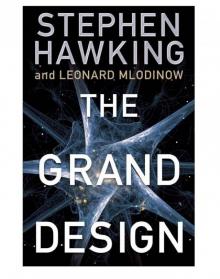 The Grand Design
The Grand Design A Brief History of Time
A Brief History of Time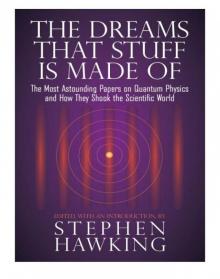 The Dreams That Stuff is Made of
The Dreams That Stuff is Made of My Brief History
My Brief History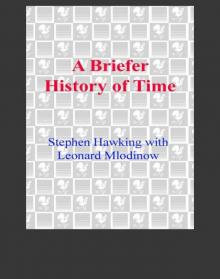 A Briefer History of Time
A Briefer History of Time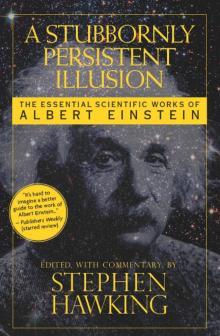 A Stubbornly Persistent Illusion
A Stubbornly Persistent Illusion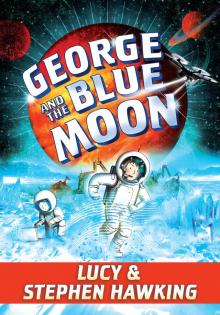 George and the Blue Moon
George and the Blue Moon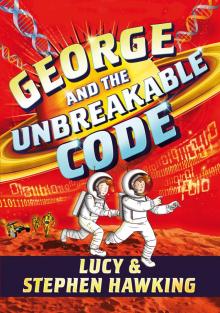 George and the Unbreakable Code
George and the Unbreakable Code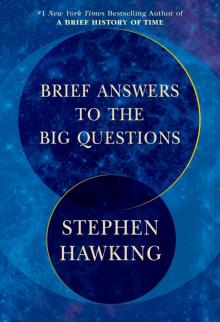 Brief Answers to the Big Questions
Brief Answers to the Big Questions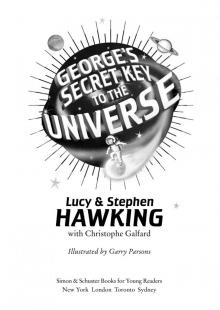 George's Secret Key to the Universe
George's Secret Key to the Universe